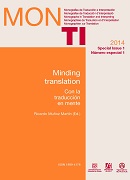The role of implicit theories in the non-expert translation process
Article Sidebar

Main Article Content
Marisa Presas Corbella
Celia Martín de León
Research into the role of implicit theories in decision-making covers a broad area ranging from personal to political relationships, and from private to professional life. To date, translation studies have paid little attention to the influence of translators’ knowledge and beliefs in the translation process, and even less to the role of implicit theories. In a pilot study with translation trainees, we attempted to reconstruct their theories about translation and discern to what extent these theories influence both the translation process and the translated text. Our results so far show that trainees do entertain initial implicit theories, which can be modified through experience and formal instruction. These initial implicit theories mainly focus on the notions of transfer and change, and do not reflect the complexity of translation phenomena. With regard to the translation process, our analysis of corrections as well as the length and structure of text-production segments suggests that the informants approach translation at a micro level, which may be partly due to the influence of their concept of translation as transfer. This pilot study is part of a broader research project that analyzes the evolution of initial implicit theories about translation as a result of experience and formal training, and to what extent changes in the theoretical framework of translation trainees can bring about changes in the way they translate.
Keywords
Implicit theories, Translation process research, Conceptual metaphor, Translation patterns, Translator training
Article Details
How to Cite
Presas Corbella, Marisa; and Martín de León, Celia. “The role of implicit theories in the non-expert translation process”. MonTi: Monografías de Traducción e Interpretación, pp. 273-02, https://raco.cat/index.php/MonTI/article/view/292857.